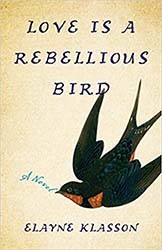In the early 1920s, the Czernitski family escapes anti-Semitism in Russia by immigrating to Chicago. By the age of ten, Lena Czernitski has experienced many hardships, including the murder of her grandfather and the uncertainties of living in a new country. Lena begins to record a list of her fears, which she returns to and reflects on throughout the novel, which include never speaking English well enough, never having a home that is safe, and no one helping her in school. She feels that she will always stand out from the other children and therefore envies her young cousin Leah Grace, who was born in Chicago and doesn’t have to struggle with otherness.
Lena’s fears are realized through unfortunate events that occur in her family throughout the book, including death, abuse, affairs, mental illness, and sibling rivalry, but she is also able to cross out some of her fears as she matures. She tries to figure out her place within her family. She discovers a talent for drawing that gets her into trouble at school when her teacher refuses to believe that Lena could create something beautiful. Then Lena meets a boy named Max who is as equally interested in creating beauty through music as she is through art. Lena experiences companionship and first love as they try to understand the world around them, confiding in each other about their deepest thoughts and family secrets.
Alongside Lena’s coming-of-age story of Lena, other concerns develop within her family and become important to the story’s plot, including negotiating Jewish customs and family within this new American culture, and difficulties assimilating that cause some members of Lena’s family to realize that America is not exactly the Goldene Medina they had hoped it would be.
Ronna Wineberg has brought this period of American history in Chicago to life. Lena’s story not only provides a glimpse into the life of a Jewish immigrant and her family in the ‘20s but lets readers rejoice in the beauty of Lena’s growth and her ability to see good in a world that has not always appreciated her.
Jamie Wendt is the author of the poetry collection Laughing in Yiddish (Broadstone Books, 2025), which was a finalist for the 2022 Philip Levine Prize in Poetry. Her first book, Fruit of the Earth (Main Street Rag, 2018), won the 2019 National Federation of Press Women Book Award in Poetry. Her poems and essays have been published in various literary journals and anthologies, including Feminine Rising, Catamaran, Lilith, Jet Fuel Review, the Forward, Minyan Magazine, and others. She contributes book reviews to the Jewish Book Council. She won third prize in the 2024 Reuben Rose Poetry Competition and won second prize for the 2024 Holloway Free Verse Award through the Illinois State Poetry Society. Wendt holds an MFA in Creative Writing from the University of Nebraska Omaha. She lives in Chicago with her husband and two kids. Follow her online at https://jamie-wendt.com/ or on Instagram @jamiewendtpoet.





